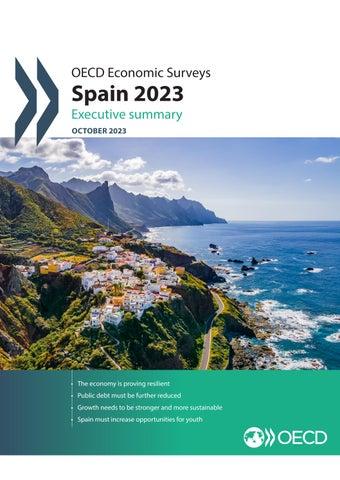The Organisation for Economic Co-operation and Development (OECD) has released its latest Economic Survey for Argentina, offering a comprehensive analysis of the nation’s economic performance and outlook as it approaches 2025. This report provides critical insights into Argentina’s ongoing challenges, including inflation control, fiscal reforms, and sustainable growth strategies. As the South American country navigates a complex global economic environment, the OECD’s assessment outlines key policy recommendations aimed at stabilizing the economy and fostering long-term development. This article explores the main findings of the OECD Economic Surveys: Argentina 2025 and their implications for policymakers and investors alike.
Argentina’s Economic Growth Faces Structural Challenges Amid Global Uncertainty
Despite recent positive indicators, Argentina’s economic trajectory remains hindered by deep-rooted structural issues that threaten sustainable development. Key hurdles include persistent inflationary pressures, a volatile exchange rate, and a high debt burden, which collectively undermine investor confidence and complicate fiscal management. Furthermore, labor market rigidities and fragmented social policies limit the government’s ability to implement reforms that could stimulate productivity and inclusive growth. The OECD emphasizes the urgency for adopting comprehensive measures aimed at enhancing economic resilience against both internal imbalances and shifting global dynamics.
Global economic uncertainty, amplified by geopolitical tensions and evolving trade patterns, further complicates Argentina’s outlook. To navigate these headwinds effectively, the report highlights several critical priorities:
- Strengthening fiscal discipline: Reducing primary deficits to stabilize public debt levels.
- Improving monetary policy frameworks: Targeting inflation with increased transparency and independence.
- Promoting structural reforms: Enhancing labor market flexibility and upgrading infrastructure.
| Challenge | Current Status | OECD Recommendation |
|---|---|---|
| Inflation Rate | ~90% (2024 Est.) | Implement inflation targeting regime |
| Public Debt | ~80% of GDP | Fiscal consolidation and debt restructuring |
| Labor Market | High informality, rigid regulations | Reform labor laws to increase flexibility |
Policy Reforms Urged to Stabilize Inflation and Boost Investment
To address persistent inflationary pressures, the OECD recommends a comprehensive overhaul of Argentina’s economic policies aimed at stabilizing prices while fostering an environment conducive to sustainable investment. Key measures include enhancing fiscal discipline through streamlined public expenditure and strengthening the central bank’s independence to support credible monetary policies. Additionally, reducing distortive subsidies and reforming tax structures are emphasized as vital steps to restore market confidence and stimulate private sector participation.
- Strengthen fiscal frameworks with clear medium-term targets
- Implement inflation-targeting regimes anchored in transparency
- Promote investment-friendly regulations to attract foreign and domestic capital
- Enhance competition policies to reduce market inefficiencies
| Policy Area | Current Challenge | Recommended Action |
|---|---|---|
| Monetary Policy | High inflation volatility | Central bank autonomy & inflation targeting |
| Fiscal Policy | Deficit and debt concerns | Expenditure rationalization & revenue reform |
| Investment Climate | Regulatory barriers | Streamlining procedures & legal certainty |
Recognizing the crucial role of investment for Argentina’s recovery, the OECD stresses the importance of creating a stable macroeconomic backdrop paired with improved governance and institutional transparency. Encouraging public-private partnerships and boosting innovation through targeted incentives are also proposed as mechanisms to drive long-term growth. By prioritizing these reforms, Argentina can unlock new opportunities for economic diversification, job creation, and increased competitiveness on a global scale.
Strengthening Social Safety Nets and Enhancing Education Key to Inclusive Recovery
Bolstering Argentina’s social safety nets is paramount to fostering an inclusive and resilient recovery. Targeted support programs can significantly reduce poverty and inequality, enabling vulnerable populations to better withstand economic shocks. The OECD highlights the urgency of expanding social assistance coverage, improving benefit adequacy, and enhancing the efficiency of delivery mechanisms. By focusing on those most affected by the pandemic’s economic fallout, Argentina can lay the foundation for a more equitable society.
Education reforms are equally critical in driving long-term inclusive growth. Emphasizing quality and accessibility, especially in disadvantaged areas, will bridge socio-economic divides and equip future generations with necessary skills. The report advocates prioritizing:
- Early childhood education to support cognitive development
- Teacher training and incentives to enhance learning outcomes
- Digital infrastructure facilitating remote learning and addressing urban-rural disparities
| Key Indicator | 2019 | 2024 Target |
|---|---|---|
| Social Assistance Coverage (%) | 45 | 65 |
| Early Childhood Enrollment (%) | 58 | 75 |
| Internet Access in Schools (%) | 70 | 90 |
Key Takeaways
As Argentina navigates a complex economic landscape, the OECD’s 2025 Economic Survey offers a timely and comprehensive analysis of the country’s challenges and opportunities. With recommendations aimed at fostering sustainable growth, enhancing fiscal stability, and strengthening institutions, the report provides a critical roadmap for policymakers seeking to stabilize the economy and boost resilience. As Argentina implements these reforms, the international community will be watching closely to see how the nation balances short-term pressures with long-term ambitions in the coming years.




